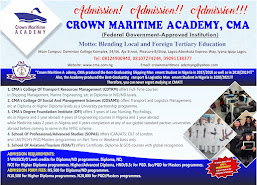Port Efficiency: Ministers, Customs CG, NRC Strategize Toward Effective Trade Facilitation
Kathy Kyari
The Ministry of Marine and Blue Economy hosted a crucial strategic meeting that marked a significant turning point in Nigeria's maritime landscape on Monday.
The main goal of this cooperative venture, according to a joint statement signed by Ismail Omipidan, media assistant to the honourable minister of maritime and blue economy, and Abdullahi Maiwada, national public relations officer of Nigeria Customs, was to discuss and implement ideas that would not only open up ports but also promote seamless cooperation, trade, and facilitation. The strategic integration of Non-Intrusive Inspection Technology (NIIT) to enhance operational efficiency in Nigerian seaports was a major topic of discussion.
Sen. Said Ahmed Alkali, the honorable minister of transportation, Hon. Gboyega Oyetola, the honorable minister of marine and blue economy, CGC of customs, Bashir Adeniyi, and Fidet Okhiria, the managing director of the Nigerian Railway Corporation, (virtually attendee).
The meeting's main resolutions acknowledged the critical role that NIIT plays in actively clearing ports of congestion, and they gave the Comptroller General of Customs the responsibility to promote and give precedence to cargo scanning over more conventional physical screening techniques.
Prompt action was also recommended to correct and improve all current scanners at important ports like PTML, Tincan Island, Apapa, and Onne. Concurrently, the current mobile scanners will be arranged in a deliberate manner to enable quick cargo examinations.
The Nigerian Railway Corporation, NRC pledged sustained commitment to freight cargoes to Inland container depots/dry ports, a strategic initiative to reduce congestion at key ports. Also Plans for the effective removal of containers from Port Harcourt to Aba were revealed, with plans for Onne Port additions in the future.
In light of the rail track development, the NRC decided to forego the stationary scanner at Apapa, citing practical considerations. According to them, this guarantees the uninterrupted advancement of the scanning procedure throughout critical infrastructure development.
The exploration of Public-Private Partnerships to supervise the implementation and upkeep of scanning technologies was promoted throughout the meeting. This cooperative approach seeks to maintain productivity and promote creativity in the procedures used for cargo inspection.
"The collaborative synergy witnessed in this meeting underscores the unwavering commitment of the Nigerian government to cultivate a conducive and efficient trade environment. The anticipated implementation of these resolutions is poised to positively impact port decongestion, trade facilitation, and overall operational efficiency and competitiveness". The statement reads.


















0 Comments